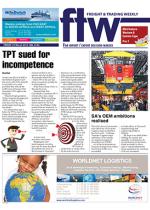The country’s power crisis is
possibly the biggest challenge
to business in the Western
Cape, according to Janine
Myburgh, president of the
Cape Chamber of Commerce
and Industry.
“Estimates are that stage
one load shedding costs
business R6 billion a month,
stage two R12 billion and
stage three R24 billion,” she
said. “These are national
figures but the Western Cape
probably accounts for 11% of
these losses.
“When businesses sustain
losses on this scale job losses
are inevitable.”
In addition, said Myburgh,
major new projects were
being postponed until energy
security returned and foreign
investors would inevitably
look elsewhere for more secure
places to build their factories.
On the positive side,
however, the energy crisis has
provided a great incentive
for green industries which
have the potential to create
new jobs and possibly even
products for export.
“We are fortunate in
that the Cape Town City
Council has been the first
local authority to allow its
electricity consumers to install
solar panels and feed their
surplus electricity back into
the grid,” she said.
Whilst the Western Cape
was holding up well in the
current tough economic
environment – and arguably
slightly better than the rest
of the country – finding longterm
solutions to the energy
crisis was essential said
Myburgh.
INSERT & CAPTION
Major new projects
are being postponed
until energy
security returns and
foreign investors
will inevitably look
elsewhere.
– Janine Myburgh

